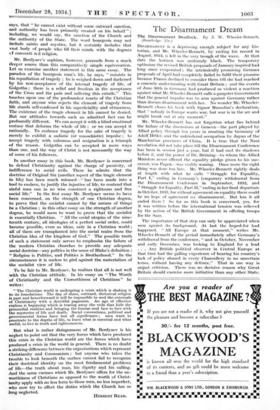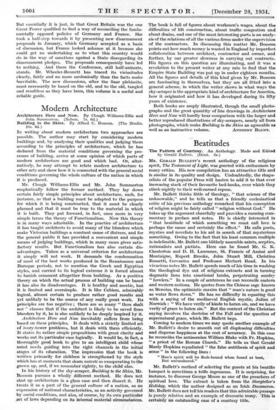The Disarmament Dream
The Disarmament Deadlock. By J. W. Wheeler-Beimett. (Routledge. l 5e.)
DISARMAMENT is a depressing enough subject for any his- torian, and Mr. Wheeler-Bennett, by ending his record in August, 1934, is left in the very trough of the wave. At that date the horizon was uniformly black. The temporary optimism the revised British proposals of January inspired had long since evaporated ; the intrinsically promising German proposals of April had completely failed to fulfil their promise because France declined to consider them till she had reached a concrete understanding with Great Britain ; and the events of June 30th in Germany had produced so violent a reaction against what Mr. Wheeler-Bennett-calls a gangster Government that the general impulse was to arm against Germany rather. than discuss disarmament with her. No wonder Mr. Wheeler- Bennett closes his book with Signor. Mussolini's declaration, that nobody in Europe wants war, but war is in the air and might break out at any moment."
Mr. Wheeler-Bennett has not forgotten what lies behind the failure of the discussions at Geneva—the part played by Allied policy through ten years in creating the Germany of Adolf Hitler, and the unhindered occupation by Japan of the Manchurian provinces of China. It is true that the Nazi revolution did not take place till the Disarmament Conference has been in session just a year, but it had cast its shadows before it, and the power of Dr. Bruning—to whom the Allied Ministers never offered the equality pledge given to his suc- cessor, von Papen—was visibly waning. Once more the right thing was done too late. Mr. Wheeler-Bennett rightly deals at length with what he calls " Struggle for Equality, Part I," ending in Germany's temporary withdrawal from the Disarmament Conference in September, 1982, and " Struggle for Equality, Part II," ending in her final departure in October, 1933, for without agreement on equality there could be no hope of agreement on disarmament. But has it all ended there ? So far as this book is concerned, yes, for it was written before the international tension was relieved by the action of the British Government in offering troops for the Saar.
The importance of that step can only be appreciated when seen against its background. At last the hoped-for had happened. " All Europe at that moment," writes Mr. Wheeler-Bennett of the period immediately after Germany's withdrawal from the conference, " and in October, November and early December, was looking to England for a lead . . . Any British political observer in Central Europe at that time had the galling experience of hearing his country's lack of policy abused in every Chancellery in no uncertain terms, without having any defence." That in one way is unjust criticism. There was no decisive reason why Great Britain should exercise more initiative than any other State.
But essentially it is just, in that Great Britain was the one Great Power qualified to find a way of reconciling the funda- mentally opposed policies of Germany and France. She took a half-step towards it by presenting new disarmament proposals in January, which Germany accepted as a basis of discussion, but France looked askance at it because she could get no undertaking as to what this country would do in the way of sanctions against a State disregarding its disarmament pledges. The proposals consequently have led to nothing. And there the Conference, still half-animate, stands. Mr. Wheeler-Bennett has traced its vicissitudes clearly, fairly and no more sardonically than the facts make inevitable. The new discussions, after the Saar plebiscite, must necessarily be based on the old, and to the old, tangled and resultless as they have been, this volume is a useful and reliable guide.



































 Previous page
Previous page